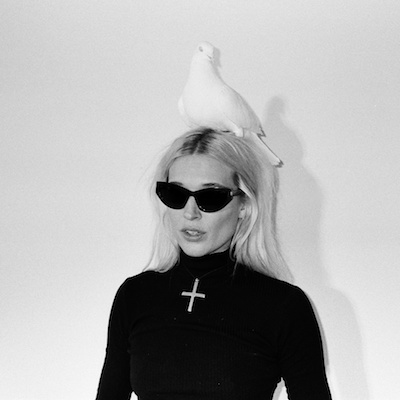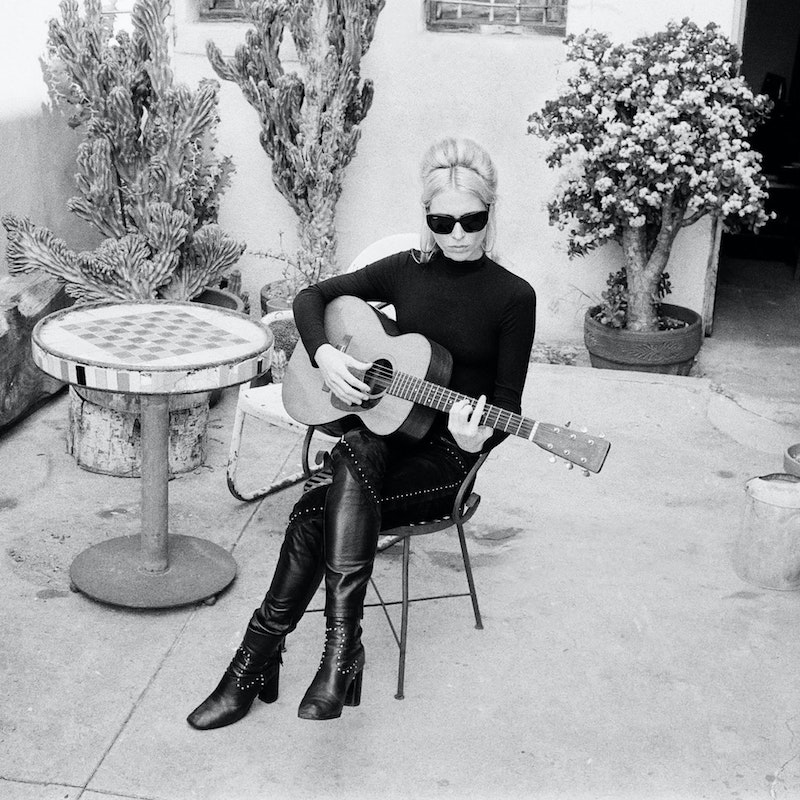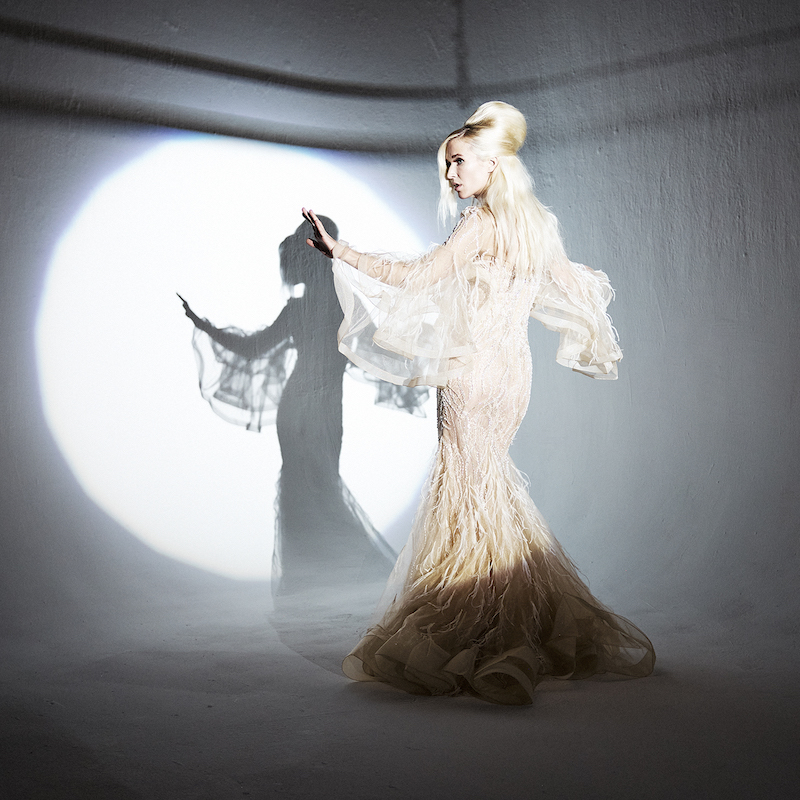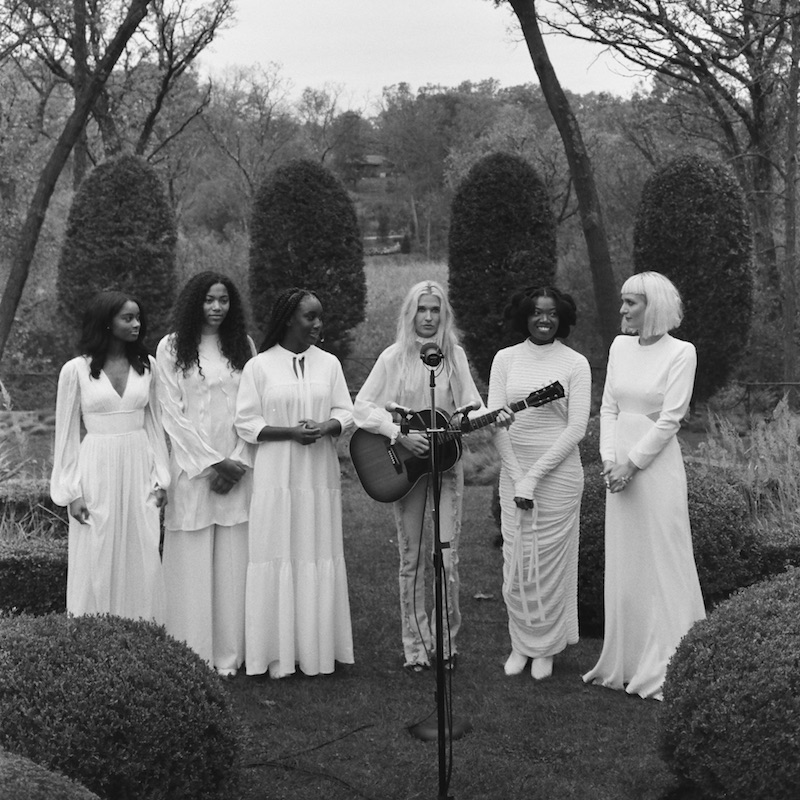
by Clara Mann
In darkness, Natalie Bergman found the true meaning of love, honesty and faith
Mercy, Natalie Bergman’s solo debut, is a journey through a place of great darkness before emerging as something bright and hopeful. Led by the album’s opener, Shine Your Light On Me, she finds strength through her faith and, most significantly, through love – as her music and words echo through this world and into the next.
The songs buzz with energy and light, and though they could be loosely labelled as gospel, it doesn’t do justice to the universality of her lyrics, nor quite contain the tenderness of her words.
I am so grateful to her for taking this time with me, and for speaking with such feeling and honesty about her record, her grief, her faith, and so many other things in-between. What started off as an interview turned into a two-way conversation, as we found we had common ground to explore, and things to ask each other that we perhaps hadn’t planned for.

Natalie and I sat down at 6pm UK time, 10am LA time, after her morning boxing session, and after a brief introduction, this is what emerged.
CM: You wrote this record, Mercy, after your father and stepmother were killed in a car crash. I can’t imagine what kind of pain you must have been through. But what was astonishing to me was that your songs are so full of hope, and joy. Could you tell me a bit about how that was – that road from one extreme of emotion to another?
NB: I felt like finding hope, finding light, was the best option that there was. That’s not always been the case for me; I’ve sometimes gone into a dark space and lived there for quite some time.
When I was grieving (and I still am), those early months were so quiet, and I felt like I didn’t have a compass or any way to navigate my life. I really felt like I did not have an identity, and it was hard for me to imagine writing music, or making artwork, or even socialising again. I felt like “there’s no one on this earth who understands what’s happening right now,” so I went inwards, and became very introspective. That lasted for a few months, and then I found music again!
It has a way of always coming back to you – we can abandon music, but it finds us. And in my life, music is my purpose, and so it became my purpose to make music specifically about my father. I adored him. He was such a loving man. He was so tender – he could dissect every beautiful thing in this life and give you his interpretation of it. It was very easy to write these sort of love songs for him, and I guess the path that allowed me to that was my connection to God, and Heaven, and the higher realm.
CM: Some of your lyrics, which I guess are quotations from Psalms, like ‘He who makes the flowers face the sun’ are so beautiful. Your songs are kind of otherworldly, but some of those images, like that one, are actually so earthly and immediate! That’s something so material, that we all see every day.
NB: (laughing) Well, look at these little yellow tulips that I have in my apartment right now – they’re facing the sun. You can sort of see them moving towards it – it’s just so sweet, these flowers that are all just reaching. Everyone wants the light; some people just don’t know how to find it.
CM: You went to a monastery (in the Chama Valley) just before you wrote this – what was that like?
NB: Yes, I was inspired there and wrote this album when I returned to Los Angeles.
In those early months after my father died, I was so isolated and I felt so alone, so I thought it would be nice to go someplace that was rooted in the faith that these Brothers had. It was all monks, I was the only woman there, and they were singing all day long – chanting. It’s a very lonely life they have, but it’s also just the ultimate test of faith. I wanted to be with people who committed themselves.
CM: I guess a lot of that time would have been silent?
NB: It was all silent. I didn’t speak for the weeks I was there, but the brothers sing, and they pray. They’re not conversing with each other, and the guests aren’t supposed to speak. It was a challenging experience. I’ve never taken an oath of silence before. It’s incredibly hard, and the first few days I just wanted to leave. I was like “why am I here? This is scary, it’s even more lonely.” It really felt harrowing at times. Those first days were cold and dark, and then I developed this pattern of silence, and of going to the abbey seven times a day, where the brothers sing.

CM: What does the word Heaven mean to you?
NB: That’s so beautiful. I feel like Heaven is the only place that I can actually understand as home. To me, ‘home’ is not in this world – my home is in a heavenly realm that we don’t understand. That’s my deepest faith and hope. My idea of it has changed since I was little. When I was young, I felt as though Heaven was in the sky, and it had angels, and there were cobbled streets, and people were singing. I don’t really think that’s necessarily what it is. I don’t think we can understand what it is fully because Heaven is just something entirely different to what any of us has ever seen, or heard, or tasted, or smelled, but I do think that there must be some sort of consciousness after death. Our spirit carries on. Where to? I’m not sure, but I’m confident that it exists.
CM: I grew up sometimes going to church, because we lived in France when I was younger, and the village community was quite focused around the church. I think for me, one of the best things about it was the music. When you’re in those spaces, a church or a cathedral, and you’re singing, and you feel your voice lifting up, to me that’s the closest one can get to what’s ‘above’, which I think is otherwise something I can’t comprehend. It feels like music is the only way to access that sometimes.
NB: Absolutely, and I think there is actually a small collective of people who believe that. I wanted to find a community of people who are connected to what’s above, because that feels really intentional, and I think that’s the good stuff of life, when a musician can connect to that. That’s the best kind of music, to me.
CM: I’ve so rarely heard that awareness of faith in counterculture music. Is it something you feel is missing from alternative music?
NM: I don’t know – it’s interesting. I’d never thought about making Christian music, or faith-driven music before. I’ve written about God in a lot of my previous work; it just wasn’t so obvious or literal. A lot of people are calling this ‘gospel music’, which maybe isn’t the most appropriate term, because gospel music is Black church music.
CM: It’s odd because you’re actually dealing with themes that a lot of more mainstream music covers – like love, and heartbreak, and hope, but adding faith into the mix.
NB: I think people are a little disoriented, but have basically been very supportive and accepting of whatever comes out of my heart. I feel this is the first time people have actually truly believed in my music – and I think it’s my most vulnerable album, the most intimate, and that’s why people feel like that. They want to see the heart, and hear it, and I think mine is coming through.
CM: You’ve spoken about your family always nurturing your love of music. What kind of music were you listening to with them?
NB: Oh all sorts. It was a fun home to grow up in. We would sing Michael Jackson, James Brown, Aretha Franklin, you know, pop music. Then there was soul music, and also the folk world, with people like Joni Mitchell and Neil Young. Then I grew up in the church, so there were always church hymns too, that my mom would play.
I learned how to harmonise in Church from my mom because she would always do the harmonies in the hymns, so that’s what I picked up – you mimic your parents. It was fun, it was a lively household, filled with creativity. I’m just thankful that I had music.
What about your family?
CM: My mum especially encouraged my sister and me. She’s a pianist and piano teacher, so I learned to play because of her. About two years ago, when I started writing songs, I realised that it was easy because these pieces were emerging from a background of music – they were kind of already there, and I didn’t even know. That love of music started in early childhood, with anything from Disney songs to classical music, church songs, jazz, folk.
NB: How could I forget about Disney? It’s such informative music. What were your favourite Disney film
CM: I really liked The Little Mermaid. I think I was jealous of her hair, apart from anything else, and the dresses she wears on land (laughs). What about you?
NB: Little Mermaid is definitely my number one – and my brother, because he had two younger sisters, knows every song. If you need him to sing any song that Sebastian sings, he will – and this is a 40-year-old man we’re talking about.
CM: I remember doing ballet classes when I was really little and doing dances to Under The Sea – I think that’s probably massively influenced my music long term (laughs). Sorry, back to the interview.

NB: Actually, I have some questions for you too. Is that okay?
CM: Of course.
NB: So firstly – did you play the fiddle on your songs?
CM: I didn’t. I wish I had! It’s actually a very close friend Mari (Tyler-Clark), she’s really talented. When I made the Consolations EP, I wanted her and her fiddle to be a part of it, so Felix (M-B) and I worked with her on those fiddle parts, and for me, her voice came through in the music in that way.
NB: I love it – I mean I love the instrumentation, the harmonies are so beautiful. And that line, what is it, ‘forced from my bed by your crying’? It’s such a beautiful line, I just want to check I got it right – your lyricism is so profound.
I know that you’ve been through some pain in your life, physical pain – I know I don’t know you, but I just read a little bit about some of what you’ve been through from a very early age, and I’m sorry that you’ve experienced that.
CM: I’m really touched that you’re talking to me about that. You must have felt this when you started talking about this album, but people often don’t really know how to talk about pain, because it’s frightening.
NB: Absolutely. These songs – what would you say are the main inspirations behind this EP that you just put out?
CM: I think it was a lot about ‘alone-ness.’ Maybe partly, too, my awareness of my own body – and learning to find the common ground between me and people who don’t have at all the same physical experience of life as I do. The music was about reaching out after feeling ‘apart’, as one does if one has been through pain or grief.
NB: Beautiful. It’s a treat to get to break into these songs. I want to spend more time with them. Has it been received well?
CM: I think it has. I didn’t really expect anyone to listen to it, not through any insecurity, but just because I made those songs for me because I love writing. I don’t know which direction I’ll go in next, or what the next step is, but I’ve realised this, music, is what I want.
NB: Have you been doing any other writing?
CM: I have – I think I’m writing now from a slightly different place: a place of much more confidence, while still holding onto the feeling of the EP. A lot of those things that I’m writing about are feelings I have lived with for a long time – they’re not just *moments* in my life that I’ve captured, so as I continue to write, and they continue to exist, I keep on adapting to how I feel those things, and I express that adjustment in my songs.
My turn again now – can I ask if you have a favourite song on Mercy?
NB: I think the song Home At Last is the greatest song I’ve ever written, and the most important one on the record. It really resembles my father and his writing. I knew him so well – he cared for lyrics so much, and would often help me with mine. We’d have conversations about my lyricism and he would come to my shows, and was just always such a support in my life artistically. That’s really what I’m missing the most right now, I have this body of songs that is entirely about him and I can’t talk to him, about it or sing these pieces for him.
The record starts with a slightly tropical feeling, and upbeat songs, so the first part is a little bit lighter to me, and allows the listener to experience the hopefulness that I was feeling. The second half of the record is the darkest half of how I was feeling, and I think you have to have both in there. There was the darkness, but through it, I found the light.
CM: I wanted to talk to you a bit about your artwork. I saw your banners, in the videos and on your social media, and I really love them. They reminded me of Sister Corita Kent’s work. What were your visual influences for this record?
NB: My visual references all kind of come from nuns. Firstly Sister Corita, then also Aimee McPherson. They were two incredibly talented individuals who spoke out in the name of love. They were just here as vessels of love, and that’s what I would like to be. I hope people will understand that from this album.
CM: Is your visual practice something that’s overlapped with your music in the past, or is it something that’s come with this project?
NB: I’ve always been a very visual person, and on my earlier project, Wild Belle, I did a lot of collage/ stop motion films. I love collage, I love drawing. I use a lot of oil pastels, Sennelier in particular. They’re the best in the world, to me, and one little stick is so expensive, but it’s worth every penny. I’ve had a lot of fun doing abstract drawings, and I’d really like to incorporate that into some of my music a bit more. I’ve always been visual. This project is another outlet to express that.
CM: The images you choose for your songs are so vivid. It made so much sense to see your banners and your sculptures in the video for Talk To The Lord. Could you tell me about where and how you made that video?
NB: I made that in the woods – we have a house there that was my father’s, so we went there after he died. It was really nice to reconnect with the earth, to go back to the woods, back to a space that my mother and father loved so much.
Mercy is out 7th May through Third Man Records.
If you’d like to support us by subscribing to our zine, click here – it’s just £6 a year for four copies (inc p&p).





